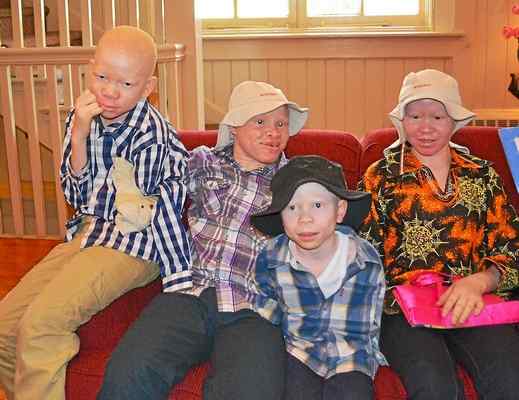The Rotary Club of West Chester (Pennsylvania, US – District 7450) is pitching in to help four Tanzanian children who have lost limbs.

This is the second trip to America for four East African kids to fit them for artificial limbs as the youngsters grow out of the old ones.
So far, to date, the West Chester Rotary Club has sponsored 12 children.
Children visiting the Thursday meeting of the West Chester Rotary have albinism, a lack of pigment, especially with the skin.
The kids have a tough time filtering ultraviolet rays both through the skin and eyes.
Witch doctors cut off the children’s limbs, for which a thriving black market in Africa exists.
The criminals profit, by as much as $75,000 per limb, from the sale of magic amulets.
In Tanzania, the children and others like them are guarded day and night, because their remaining limbs are valuable to thieves.
In one case a father took his own child’s limb.
Government officials often look the other way and tacitly allow the practice to continue.
“But God is good,” said Ester Rwela, overseer and legal guardian of the children.
“We’re making progress,” she said. “It doesn’t mean the problem is over. But we’re seeing it less and less in Tanzania. Lately they are attacking kids in neighboring countries.”
Ernest Zlotolow, director of the West Chester Rotary Club, talked about the role of Shriners Hospital, which furnishes the full medical expense for the kids until they turn 19.
Children’s Orthopedic Rehabilitation Strategies (CORS) is a tax-deductible charity that oversees the programme.
The first CORS project helped a Tanzanian woman who had lost both arms. With surgery in Vancouver, Canada, she has learned how to support herself and her child as a weaver.
The Global Medical Relief Fund, along with Rotary, the Powell Family Foundation, private individuals, and CORS pay for the expenses of the young amputees while they visit the United States for free medical treatment at Shriners.
The children were upbeat and smiled often. They were attentive at the luncheon, though they know very little English. They were able to speak through Rwela.
When asked what they liked most about America, a 10-year-old boy said that he liked the buildings, while a 16-year-old girl and 6-year-old boy both enjoy the beach. A 14-year-old boy said he enjoys computers and football, or soccer.





